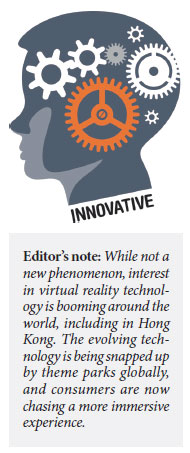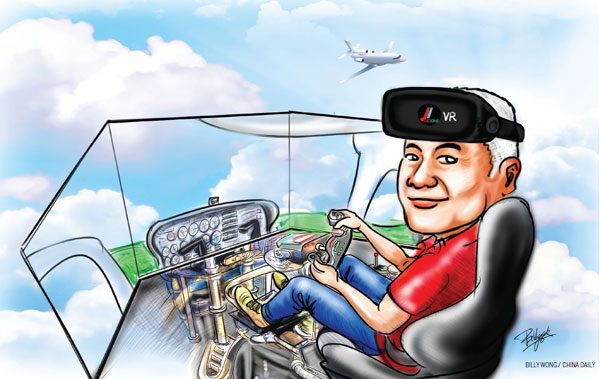Virtual reality shakes up the playing field
Updated: 2016-09-29 06:56
By Deng Yanzi in Hong Kong(HK Edition)
|
|||||||||
I'm riding a bike that looks just like any other stationary bicycle in a typical gym, and before I lose my interest in this workout session, Peter Yu puts a HTC Vive - a pair of virtual reality (VR) goggles - on my head and tightens the strap.
As I stare into the headset, the surroundings quickly transform into a desert, and I find myself riding on the back of a horse with a whip in my hand.
Under Yu's instructions, I manage to charge into some other riders ahead of me and lash them to the ground as I pedal, lean to the side and press some buttons on the handlebar.
This new VR Bike has already become one of the most popular rides at JetOne Motion's VR experience center in Central, says its CEO Yu.
"VR has radically changed the landscape of entertainment," Yu says, explaining that the technology has created a more immersive experience.

Other gaming experiences at the venue include a flight simulator, which is not just for entertainment but also for official pilot training. The company offers courses to aspiring pilots, and sent 60 flying students to flying schools in Australia last year.
With locations across Hong Kong, the company has welcomed more than 12,000 customers and featured in various events with more than 30 different pieces of VR equipment, according to Yu.
His ambition is to expand its offerings, and to eventually build a mini theme park based on the concept of VR.
Large-scale VR entertainment is booming in many parts of the world, with new concepts of VR entertainment centers being constructed, and traditional theme parks now introducing VR elements to their business.
The Void, located in Utah in the United States, is expected to be the first theme park dedicated to VR which is slated to open by the end of 2016. Visitors at the park will wear VR helmets and other gear throughout their stay, completely immersing themselves into the fantasy worlds of various battle games.
The company co-developed a Ghostbusters-themed virtual reality attraction in New York City, which opened on July 1.
Meanwhile, Shanghai-based gaming company Shanda Group announced in February it is seeking to bring the Void to China.
"We will build it (in China) as soon as we have a local partner," said Shanda Group president Robert Chiu, pledging a $350-million investment in the VR sector.
Established theme parks are also turning to VR headsets to upgrade their offerings, such as turning up the horror factor when guests roam through a haunted house.
Even roller coasters, which are already thrilling - and sometimes nauseating in their own right - are embracing VR technology to break the physical limits of these traditional rides.
Alton Towers, a theme park in England, launched the world's first roller coaster designed and built for VR in March. Strapped in and wearing VR goggles, passengers on the ride dubbed Galactica are engaged in a trip to the space, hurtling through galaxies while feeling the turns and falls on a regular roller coaster.
Some theme parks in Hong Kong, Yu reveals, have also approached the company looking for collaboration, in order to add VR elements to their traditional attractions.

VR technology has stirred up excitement among those who crave for a more immersive experience, but the high cost of owning professional VR technology and the complexity of using them are some of the reasons why the technology is not more common.
"It's not a 'plug-and-play' device like Xbox or PlayStation, and the users are expected to be proficient in (personal computers) to set it up," Yu explains.
Confident of the potential of VR technology, he believes that experience centers such as JetOne are crucial to better educate consumers of this emerging technology, and to pave the way for its wider adoption.
To expand VR outside of a relatively small community of avid gamers and developers, JetOne regularly organizes groups of students to experience its equipment, hoping to give the younger generation a better understanding of the technology.
The VR industry is projected to be a lucrative market, with an estimated $30 billion in revenue by 2020, according to US technology market researcher Digi-Capital.
"VR largely remains an entertainment market driven by hardware, games, video and theme parks, with non-entertainment apps driving a meaningful minority of revenue by 2020 as the market develops," Tim Merel, founder of Digi-Capital, wrote in its report.
Free experiences and education will be the key for VR to realize its potential, Yu believes.
"We are offering paid rides now, but we are also exploring ways to make it possible for consumers to try them out for free. We believe it's crucial to raise awareness and make the technology popular among the public," he says.
iris@chinadailyhk.com
(HK Edition 09/29/2016 page9)